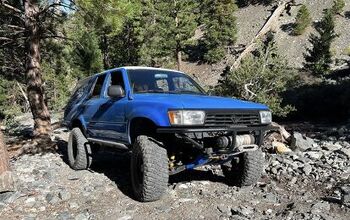Mitsubishi's Future: Go Big on SUVs, but a Sedan and Pickup Remains a Possibility

It’s hard to go anywhere without hearing it. Co-workers whispering at the water cooler, long waits at the drive-thru window while the staff argues amongst itself. It’s hard to get a word in edgewise.
People are talking about Mitsubishi.
If you’ve called on this, well, you’re right. But that isn’t to say no one’s talking about the down-on-its-luck automaker, which recently saw salvation at the hands of the Nissan-Renault Alliance. There’s more vehicles coming to the threadbare brand and, while the company’s focus remains on lucrative SUVs, that doesn’t mean Mitsubishi won’t flesh out the lineup with something traditional.
Now operating under the Alliance corporate umbrella, Mitsubishi plans to mainly go it alone on the product front for the rest of the decade. At that point, platform sharing is expected to ramp up. In the meantime, the company wants to “re-energize” its dealer network, boost profit margins, and grow U.S. sales by 30 percent by 2020.
Much of the heavy lifting (in terms of sales and PR) will come from the vastly delayed Outlander PHEV and poorly named Eclipse Cross compact crossover.
But then what? Automotive News put that question to CEO Osamu Masuko.
First off, Masuko said selling 120,000 units in the U.S. — a figure last reached in 2007 (and nearly a third of the volume the brand saw in 2002) — shouldn’t be difficult. Citing the two aforementioned models, the CEO said “the number of dealers will increase, and the performance of the business itself is going to improve. So if we do all these things, then we can hit the target. I think it’s possible.”
As for product, Masuko said, “After 2020, the impact of synergies will come to life.” While R&D efforts (and spending) will remain focused on utility vehicles, corporate sibling Nissan might have something to offer the brand.
“For example, common platforms and powertrains will be utilized. And there are going to be models on these common platforms and powertrains,” Masuko said. “In that situation, I think there will be opportunities to introduce a Mitsubishi sedan in the U.S.”
Of course, this assumes there’s even a market for sedans in 2020. But if a four-door passenger car does emerge from the partnership, it won’t be purely Mitsubishi-developed, nor will it be a badge-engineered knock-off.
“The design will be completely different,” the CEO claims. “We would like to clearly differentiate our models and show the special characteristics of each company.”
Sedans are no longer the major draw they once were, but the possibility of a pickup might perk up the ears of an increasingly utility-minded America. After offering such small pickups as the Mighty Max in the U.S., Mitsubishi’s last truck was the Dodge Dakota-based Raider. Introduced at a very bad time, the Raider proved a sales failure, biting the dust in 2009.
It’s clear from the interview that Masuko isn’t sold on the idea. Historically and currently (the L200/Triton), Mitsubishi sells little trucks, and that doesn’t necessarily go over well with American truck buyers. Still, the presence of Nissan might make it easy for Mitsubishi to field a version of its sibling’s midsize pickup.
“So for the U.S., if there is an opportunity, we might get it from Nissan,” Masuko said. “We would like to consider if there are opportunities from within the Alliance. We haven’t decided on a pickup, but there is a possibility.”
We know there’s a next-generation Nissan Frontier in the works, and Nissan is plenty okay with having other badges appear on its products. The much more modern overseas-market Navara does double duty as the Renault Alaskan and Mercedes-Benz X-Class, after all. However, it isn’t yet known whether the next-gen Frontier will simply be a Mississippi-made Navara or a heavily revamped current-gen Frontier.
In either case, there’s nothing stopping Mitsubishi from adding its own badge to the grille.
[Image: Mitsubishi]

More by Steph Willems
Latest Car Reviews
Read moreLatest Product Reviews
Read moreRecent Comments
- ToolGuy I am slashing my food budget by 1%.
- ToolGuy TG grows skeptical about his government protecting him from bad decisions.
- Calrson Fan Jeff - Agree with what you said. I think currently an EV pick-up could work in a commercial/fleet application. As someone on this site stated, w/current tech. battery vehicles just do not scale well. EBFlex - No one wanted to hate the Cyber Truck more than me but I can't ignore all the new technology and innovative thinking that went into it. There is a lot I like about it. GM, Ford & Ram should incorporate some it's design cues into their ICE trucks.
- Michael S6 Very confusing if the move is permanent or temporary.
- Jrhurren Worked in Detroit 18 years, live 20 minutes away. Ren Cen is a gem, but a very terrible design inside. I’m surprised GM stuck it out as long as they did there.


































Comments
Join the conversation
"Mitsubishi sells little trucks, and that doesn’t necessarily go over well with American truck buyers. Still, the presence of Nissan might make it easy for Mitsubishi to field a version of its sibling’s midsize pickup." From what I could find, the Navara is bigger than the L200/Triton, but not *that* much bigger. (Both 4 door crew cabs) Navara length is 5.33m L200/Triton length is 5.28m The biggest difference is a 15cm longer wheelbase on the Nissan. I believe the Mitsubishi would also be considered a midsize truck.
I think Mitsubishi for Nissan will be like Mercury was for Ford. Mitsubishi will make premium versions of Nissans and charge higher margins than Nissan because of name recognition. At Nissan it will Nissan/Mitsu/Infiniti just like Chevy/Buick/Cadillac at GM. If it works for GM why it wouldn't work for Nissan? Smart move Carlos.